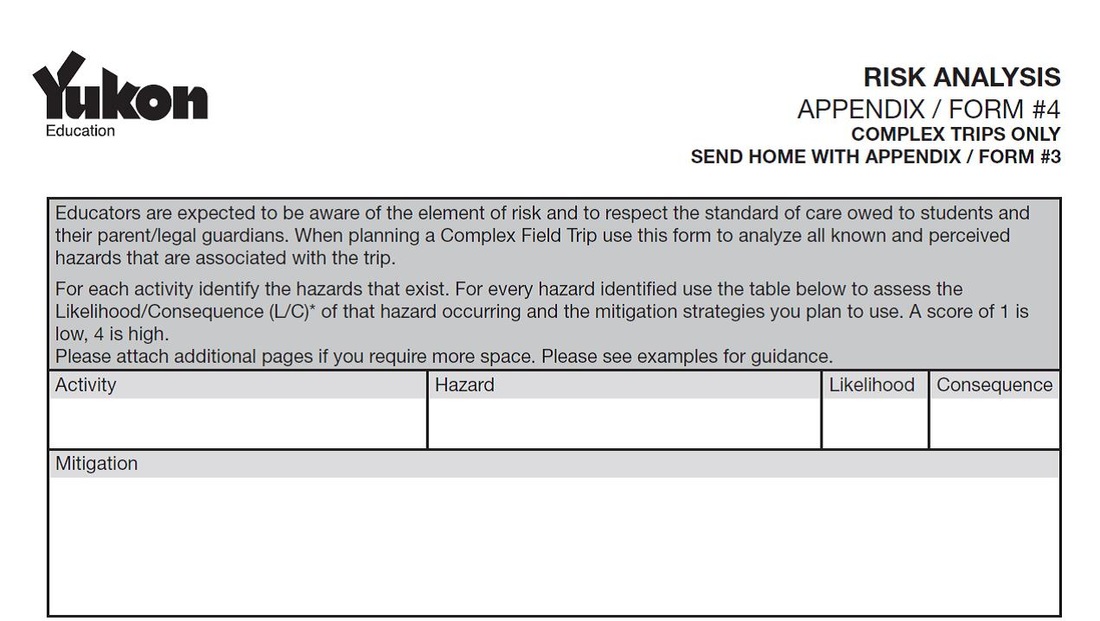Risk management
Safety is paramount in all off-site experiential learning trips. Identifying and mitigating risks is essential to all off-site learning trips. This is particularly important for complex trips.
The Department of Education recognizes that risk is always present in off-site experiential learning. We attempt to manage this inherent risk through careful planning and risk assessment.
The Department of Education recognizes that risk is always present in off-site experiential learning. We attempt to manage this inherent risk through careful planning and risk assessment.
"Risk management is not a checklist;
it is a culture and habit."
-National Outdoor Leadership School
Managing risk on off-site experiential education outings
The staff member in charge of an off-site trip is responsible for:
- Following principles and requirements of the Off-Site Experiential Learning policy and other Department of Education policies during planning and delivery of off-site trips.
- Ensuring that all aspects of risk management for the field trip have been considered and that effective mitigation measures have been incorporated to minimize the risks identified. Risk management analysis should include considerations for both the physical and psychological safety of participants.
- When a prior site visit is required, conduct the site visit to ensure full familiarity with the conditions that will prevail when the field trip takes place.
- Ensuring that all consent forms include full identification of known hazards and risks and that a plan to mitigate those risks is in place to maximize the safety of the students, staff and volunteers.
- Ensuring that the process for obtaining informed consent from parents has been completed and that a meeting is held when required to fully inform parents about the field trip
- Ensuring that all field trips have clear and expressed links to the curriculum and clearly defined learning outcomes.
- Ensures all field trip participants are fully informed of the supplies and gear required for the field trip.
- Using a medical form to document all known medical conditions of students participating in the field trip and determining whether the student will self-medicate and if the staff member in charge will maintain possession of the medication and/or a backup supply of the medication.
- Inspecting all material and gear that will be used on the field trip to ensure that it is operational, appropriate, and well maintained.
- Advising any volunteers of their responsibilities and duties required of them during the field trip, following the Volunteers in the Schools Policy and using the Volunteer Registration form.
- Maintaining a record as part of the field trip documentation of any unanticipated incidents on the field trip, including near misses, accidents, discharging of a firearm, illness/injury, and any other relevant incidents and information that the staff member in charge deems to be important.
- Assuming full responsibility for the students at all times during the field trip, leading the field trip in accordance with what was approved, and making any changes in accordance with the contingency plan or with approval from the school administrator.
Risk analysis form
This form is part of all complex trip applications.
If you need help with risk analysis, please talk to your school's administration or the Off-Site Review Committee.
Please ensure your identified risks and mitigations are specific to the trip, activity and season. Applications will be returned for editing if risk analysis does not reflect the trip itinerary.
If you need help with risk analysis, please talk to your school's administration or the Off-Site Review Committee.
Please ensure your identified risks and mitigations are specific to the trip, activity and season. Applications will be returned for editing if risk analysis does not reflect the trip itinerary.
| Risk Analysis Examples |
| Risks To Be Mitigated Examples |
Heading to the backcountry?
Risk management in the backcountry looks different. The government coordinates a response to every call for help, but their ability to respond in the backcountry requires time, information, risk analysis and consideration of the safety of responders and the public.
Before travelling please print, read and pack this document:
Before travelling please print, read and pack this document:
|
In the Backcountry:
Yukon’s Emergency Response Network |
| ||

